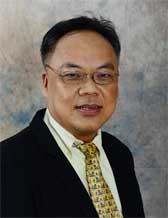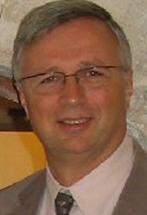
The 5th International Conference on Biomedical
Engineering and Biotechnology (ICBEB 2016)
August 1st - 4th, 2016, Hangzhou, China
• 中文版
• English

 |
Dr. Ng Yin Kwee |
| Assoc. Professor in MAE; Snr. Hall Fellow. Ng obtained a B.Eng (CL I) from Uni. of Newcastle upon Tyne; Ph.D at Cambridge Univ. with a Cambridge Commonwealth Scholarship; PG Diploma in Teaching Higher Edu., NIE-NTU. He is an invited keynotes speaker for more than 15 international scientific confs./workshops. He is active in offering consulting services & a fellow of SAF-NTU Academy. 15 of his thermal imaging papers have been adopted as references in Singapore Standard (SS 582: 2013) and ISO/IEC 80601-2-59: 2008. He is also presently serving as panel member for the Biomedical Standards Committee, Singapore.More... | |
| Speech title: Development of Integrated Index for Breast Cancer Identification with Thermal Imaging Abstract:Breast cancer is one of the prime causes of death in women worldwide. Thermography has shown a great potential in screening the breast cancer and overcomes the limitations of mammography. Moreover, interpretations of thermogram images are dependent on the specialists, which may lead to errors and uneven results. Preliminary screening method should detect the hazardous, destructive tumors effectively to improve the accuracy. The growth of malignant tumor can increase the internal temperature which can be captured by thermograms. Thus in this work, locally normalized Histogram of Oriented Gradients (HOG) based preliminary screening Computer Aided Diagnosis (CAD) tool is proposed. HOG is able to record the minute internal variations in thermograms. In order to reduce the dimensions of extracted HOG descriptors Kernel Locality Preserving Projection (KLPP) is used. The resulting KLPP features are then ranked to form an efficient classification model. Various machine learning algorithms are used to validate the proposed method. Our method shows a promising performance with an average accuracy, sensitivity, and specificity of 98 %, 96.66 % and 100 % respectively. We have also developed a Breast Cancer Risk Index (BCRI) using significant KLPP features which can discriminate the two classes using a single integrated index. This can help the radiologists to discriminate the normal and malignant classes during screening to validate their findings. | |
 |
Dr. Roy D. Sleator |
| Dr Sleator graduated from University College Cork with a BSc (1H) in Microbiology, an MA (1H) in Education and a PhD in Molecular Biology, and holds a PGCert in Bioinformatics from The University of Manchester, UK. Sleator is a Fellow of the Royal Society of Biology (FRSB). In 2006 he was awarded the SfAM WH Pierce Prize and was the recipient of the prestigious ESCMID Research Fellowship in 2004 (joint ESCMID-FEMS), 2010 and again in 2011. Sleator is a Senior Lecturer at the Department of Biological Sciences and a PI at Cork Institute of Technology’s Centre for Research in Advanced Therapeutic Engineering (CREATE) and the Alimentary Pharmabiotic Centre (APC) at UCC. He is also founding Editor-in-Chief of the scientific journal Bioengineered, published by Taylor and Francis. Follow Sleator on Twitter and LinkedIn |
|
|
Speech title: Following my Gut Feelings: From Pathogens to Probiotics and Back Abstract:Sleator’s talk centres on the human gastrointestinal tract; focusing on the bacterial stress responses needed to overcome the physiochemical defences of the host, specifically how these stress survival strategies can be used as targets for alternative infection control strategies. Recent developments in molecular diagnostics; centring on the shifting paradigm from culture to molecular based diagnostics, will also be discussed in the context of identifying new gastrointestinal pathogens. | |
 |
Dr. Joel N. Buxbaum |
|
Dr. Buxbaum is Professor of Molecular and Experimental Medicine at The Scripps Research Institute in La Jolla, CA, USA. He has investigated disorders of protein conformation, chiefly the hereditary and sporadic amyloidoses caused by normal serum and CSF protein transthyretin. He has identified mutations in this systemic amyloid precursor and developed transgenic models for mutant and wild type forms of transthyretin. One such mutation in this protein may be responsible for as much as ten per cent of congestive heart failure in elderly African-Americans. He has now identified new functions for transthyretin and related these to resistance to amyloid deposits, particularly in the central nervous system, where it appears to behave as a multi-modal suppressor of the pathogenic processes involved in the development of Alzheimer’s disease, a finding that may well be shared by other amyloid precursor pairs. This apparently common phenomenon raises the question whether other proteins, via heterotypic protein-protein interactions – may serve as “non-professional chaperones” while their mutant versions lead to pathologic aggregation via homotypic interactions. Dr. Buxbaum, a graduate of Union College and the Tuft Medical School, completed five years of post-doctoral research with E.C. Franklin at NYU and Matthew Scharff at Albert Einstein College of Medicine. He rose to the rank of full professor at New York University School of Medicine where he remained until 1999 when he moved to the Scripps Research Institute. He has been elected to the American Society for Clinic Investigation and the Association of American Physicians. He has served on numerous review panels including the Advisory Council of the National Human Genome Research Institute and as the Chairperson of the Clinical and Investigative Research Council of the American Cancer Society. He was a Senior Scholar in Aging of the Ellison Foundation and was a recipient of a Dart/NYU Technology award in 2013. |
|
 |
David De Jong |
| David De Jong Ph.D. (Cornell University) is a geneticist and entomologist. He has been a faculty member of the Ribeir?o Preto School of Medicine in the University of S?o Paulo since 1988, where he teaches genetics, evolution and scientific writing in the Genetics Department. He has also given scientific writing courses in various universities, throughout Brazil. Dr. De Jong’s principal areas of research are honey bee pathology, behavior, nutrition and genetics. He is an international consultant in apiculture, having participated in projects for FAO (Food and Agriculture Organization of the United Nations), IDB (Interamerican Devolopment Bank) and various other organizations in the majority of the countries in Central and South America, as well as South Korea, and has given talks and courses as an invited speaker in more than 20 countries. Dr. De Jong was associate editor of the Brazilian Journal of Genetics (renamed Genetics and Molecular Biology) from 1988 to 2001 and associate editor of Genetics and Molecular Research from 2002 to 2015. He is the author of over 100 refereed papers and has also authored several books and book chapters. He is known and consulted as a specialist on (honey bee) colony collapse disorder (CCD), Africanized honey bees, and honey bee pathology, especially because his research on the parasitic mite, Varroa destructor, the principal agent causing bee mortality worldwide. | |
|
Speech title: Strategies to improve the impact of your papers and the probability of publishing in top level journals Abstract:The impact of your paper depends on many factors, including the journal that you publish it in, your “name”, the relevance of your work within and outside your area of expertise, the institution that you work at, the fame of your co-authors, the paper title, how you word your abstract, the language you publish in, the wording and clarity of the writing, and the current interest in the topic you have chosen. Improving the chance of publishing in top level journals and the impact of your paper in terms of recognition by the lay and scientific communities can be accomplished by careful planning of the research and the manuscript.More... | |
 |
FRANCISCO A. MOURA DUARTE |
|
BSc (1964): Federal University of Minas Gerais; PhD (1968): University of Brasilia. Professor at the University of S?o Paulo, Founding President (1983) of the Foundation for Scientific Research of Ribeir?o Preto, and Founding member (1985) of the Brazilian Society of Science Editors. Editor-in- chief, Genetics and Molecular Biology, for 20 years (1978 to 1998). Founder and Editor-in- chief (2002) of the free access online journal Genetics and Molecular Research. President and Founder (2003), Ribeir?o Preto Academy of Sciences. Expertise includes Genetics, Quantitative and Molecular Population Genetics, and Animal Genetics. |